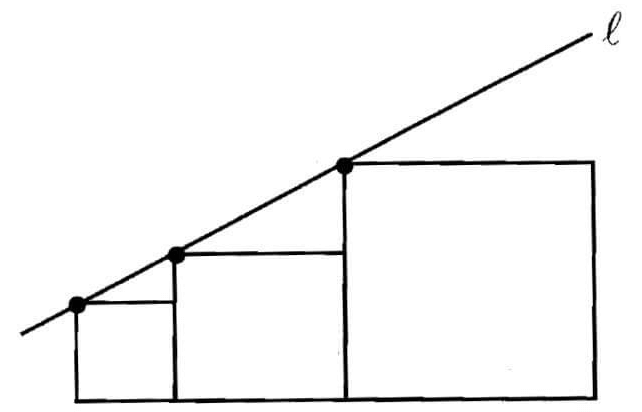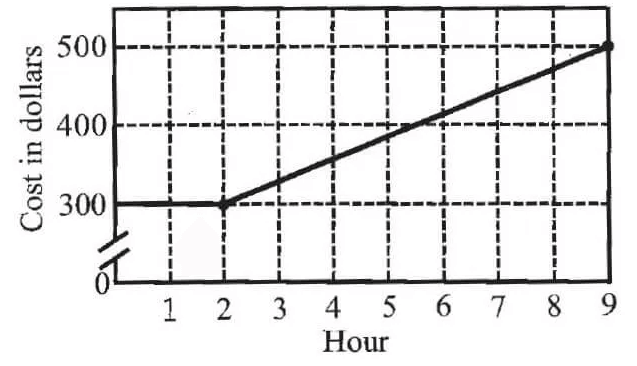FIND THE SEQUENCE WITH THE GIVEN WITH GIVEN RULE
Use the rules to list the first six terms of the sequence :
Example 1 :
Start with 1 and add 2 each time
Solution :
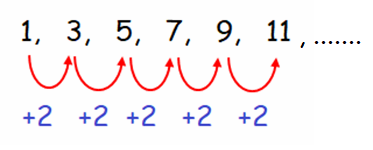
Hence, the first six terms of the sequence are
1, 3, 5, 7, 9, 11, ........
Example 2 :
Start with 3 and multiply by 2 each time
Solution :

Hence, the first six terms of the sequence are
3, 6, 12, 24, 48, 96, ................
Example 3 :
Start with 24 and subtract 8 each time
Solution :
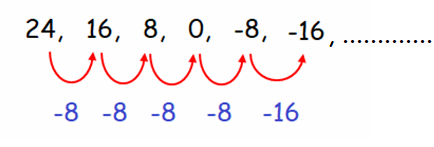
Hence, the first six terms of the sequence are
24, 16, 8, 0, -8, -16, ...............
Example 4 :
Start with 32 and divide by 2 each time
Solution :
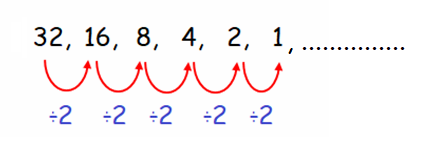
Hence, the first six terms of the sequence are
32, 16, 8, 4, 2, 1, ..........
Example 5 :
start with 5 and double each time
Solution :

Hence, the first six terms of the sequence are
5, 10, 20, 40, 80, 160, .........
Example 6 :
Start with 1 and 2 and add the previous two numbers to get the next one.
Solution :
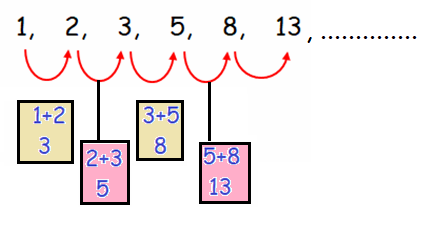
Hence, the first six terms of the sequence are
1, 2, 3, 5, 8, 13, .............
Example 7 :
For the sequence
6, 12, 24, 48, 96, ............
a) Calculate the next 2 terms of the sequence.
b) Determine the general formula for nth term.
Solution :
6, 12, 24, 48, 96, ............
By observing the sequence, we know that to get the next term we have to multiply the preceding term by 2
a) 6th term
= 96 (2)
= 192
7th term :
= 192 (2)
= 384
So, the next two terms are 192 and 384.
b) General formula
tn = ar(n-1)
a = 6, r = 2
tn= 6(2)n-1
Example 8 :
Calculate the next three terms of the sequence.
1, 4, 16, 64, 256
i) Determine the formula for the nth term of the sequence.
Solution :
By observing the sequence, each number is a perfect square. These are perfect squares of multiples of 4.
i) Next three terms will be :
12, 22, 42, 82, 162, 322, 642, 1282, ........
1, 4, 16, 64, 256, 1024, 4096, 16384, .............
General term :
(2n - 1)2
Example 9 :
Determine the formula for the general term of each of the following sequences :
i) 15, 75, 375, 1875, 9375,.............
ii) 1, 3, 9, 27, 81, ............
iii) 20, 200, 2000, 20000, .........
iv) 4, 28, 196, 1372, 9604, .............
Solution :
i) 15, 75, 375, 1875, 9375,.............
General term :
Dividing each term by the preceding term, we get 5. So, the given sequence is geometric sequence.
First term (a) = 15, common ratio (r) = 5
tn = arn - 1
= 15(5)n - 1
ii) 1, 3, 9, 27, 81, ............
General term :
Dividing each term by the preceding term, we get 3. So, the given sequence is geometric sequence.
First term (a) = 1, common ratio (r) = 3
tn = arn - 1
= 1(3)n - 1
iii) 20, 200, 2000, 20000, .........
General term :
Dividing each term by the preceding term, we get 10. So, the given sequence is geometric sequence.
First term (a) = 20, common ratio (r) = 10
tn = arn - 1
= 20(10)n - 1
iv) 4, 28, 196, 1372, 9604, .............
General term :
Dividing each term by the preceding term, we get 7. So, the given sequence is geometric sequence.
First term (a) = 4, common ratio (r) = 7
tn = arn - 1
= 4(7)n - 1
Example 10 :
A plant that is 17 cm tall grows 2 cm each week.
a) Continue the sequence
17, ___, _____, _____
1 week, 2 weeks, 3 weeks
b) How tall will the plant be after three weeks ?
c) After how many weeks will the plant be 27 cm tall?
Solution :
a) Every week it grows 2 cm.
17, (17 + 2), (19 + 2), (21 + 2)
Week 1 = 19
Week 2 = 21
Week 3 = 23
b) After 3 weeks,
the height of the plant is 23 cm
c) When height = 27
tn = a + (n - 1) d
a = 17 and d = 2
tn = 17 + (n - 1) (2)
27 = 17 + (n - 1) (2)
27 - 17 = 2(n - 1)
10 = 2(n - 1)
10/2 = n - 1
5 = n - 1
n = 5 + 1
n = 6
So, after 6 weeks the height of the plant is 27 cm.
Example 11 :
Make a pattern to solve the problem.
a) Hanna has $49. She spends $8 each day. How much money does she have left after 5 days ?
b) Matt has roll of 74 stamps. He uses 7 stamps each day for 4 days. How many stamps are left ?
Solution :
a) To find the amount left after 5 days, we have to find the first 5 terms.
49, (49-8), (41 - 8), (33 - 8), (25 - 8),. .....
49, 41, 33, 25, 17,............
So after 5 days $17 is the left.
b) Number of stamps initially = 74
To find the number of stamps after 4 days, we have to find the 4th term.
Number of stamps uses = 4
tn = a + (n - 1) d
= 74 + (4 - 1)(4)
= 74 + 3(4)
= 74 + 12
= 86
So, number of stamps after 4 days is 86.
Kindly mail your feedback to v4formath@gmail.com
We always appreciate your feedback.
©All rights reserved. onlinemath4all.com
Recent Articles
-
Digital SAT Math Problems and Solutions (Part - 146)
Apr 18, 25 06:52 AM
Digital SAT Math Problems and Solutions (Part - 146) -
Logarithmic Derivative Problems and Solutions
Apr 16, 25 09:25 PM
Logarithmic Derivative Problems and Solutions -
Digital SAT Math Problems and Solutions (Part - 145)
Apr 16, 25 12:35 PM
Digital SAT Math Problems and Solutions (Part - 145)
